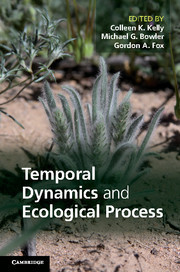Temporal Dynamics and Ecological Process
Langue : Anglais
Coordonnateurs : Kelly Colleen K., Bowler Michael G., Fox Gordon A.

A unique compilation of papers on the emergent topic of temporal dynamics in community ecology, ecosystem biology and evolution.
In contrast with the fundamental ecological expectation that similarity induces competition and loss of species, temporal dynamics allows similar species to co-occur. In fact, the coexistence of similar species contributes significantly to species diversity and could affect ecosystem response to climate change. However, because temporal processes take place over time, they have often been a challenge to document or even to identify. Temporal Dynamics and Ecological Process brings together studies that have met this challenge and present two specific aspects of temporal processes: reproductive scheduling and the stable coexistence of similar species. By using plants to extract general principles, these studies uncover deep ties between temporal niche dynamics and the above central ecological issues, thereby providing a better understanding of what drives temporal processes in nature. Written by leading scientists in the field, this title will be a valuable source of reference to research ecologists and those interested in temporal ecology.
1. Introduction Colleen K. Kelly, Michael G. Bowler and Gordon A. Fox; Part I. Observing Temporal Processes in Nature: 2. The storage effect: definition and tests in two plant communities Peter Chesson, Nancy J. Huntly, Stephen H. Roxburgh, Marissa Pantastico-Caldas and José M. Facelli; 3. What temporal processes in trees tell us about competition, community structure and speciation Colleen K. Kelly, Michael G. Bowler, Gordon A. Fox, J. Arturo Solís-Magallanes, J. Marcela Ramos-Tapia, Pilar Lopera Blair, Susan Schwinning, John N. Williams and Jeffrey B. Joy; 4. Testing the storage effect with long-term, observational data Peter B. Adler; 5. Seedling herbivory and the temporal niche Mick E. Hanley and Rebecca J. Sykes; 6. Temporal variation in density dependence in an herbaceous community Norma L. Fowler and Craig M. Pease; 7. Population and community dynamics in variable environments: the desert annual system D. Lawrence Venable and Sarah Kimball; 8. Temporal niches, ecosystem function, and climate change Susanne Schwinning, Gordon A. Fox and Colleen K. Kelly; Part II. Application to Specific Questions: 9. Evolution of synchronized and intermittent reproduction (masting) of trees: key role of regeneration dynamics Yoh Iwasa, Akiko Satake and Yuuya Tachiki; 10. Spatiotemporal variation can promote coexistence more strongly than temporal variation Robin E. Snyder; 11. Roles of pollinator attraction and environmental fluctuation in inducing flowering synchrony Akiko Satake, Yuuya Tachiki and Yoh Iwasa; 12. Temporal dynamics and the spread of insect resistance transgenes Michael G. Bowler, Felix Breden and Colleen K. Kelly; 13. Concluding remarks Gordon A. Fox, Michael G. Bowler and Colleen K. Kelly; Index.
Colleen K. Kelly is a Senior Research Associate in the Department of Zoology at the University of Oxford. Her research interests focus on temporal dynamics, community assembly and ecosystem function. She has published widely on these topics and has been a principal investigator or co-PI on various funded projects in the US, the UK and Mexico.
Michael G. Bowler has worked at the Department of Physics at the University of Oxford for over 40 years. His research interest is focused on particle physics. He has taken part in several major collaborations in this field, most recently the Sudbury Neutrino Observatory. He has authored or co-authored 150 papers and written five books.
Gordon A. Fox is Associate Professor in the Department of Integrative Biology at the University of South Florida. His main area of research is plant ecology and theoretical population biology. His recent work has focused on demographic heterogeneity and its causes and consequences including both theoretical studies and research with populations of pines, lilies and Florida scrub-jays.
Michael G. Bowler has worked at the Department of Physics at the University of Oxford for over 40 years. His research interest is focused on particle physics. He has taken part in several major collaborations in this field, most recently the Sudbury Neutrino Observatory. He has authored or co-authored 150 papers and written five books.
Gordon A. Fox is Associate Professor in the Department of Integrative Biology at the University of South Florida. His main area of research is plant ecology and theoretical population biology. His recent work has focused on demographic heterogeneity and its causes and consequences including both theoretical studies and research with populations of pines, lilies and Florida scrub-jays.
Date de parution : 01-2014
Ouvrage de 333 p.
15.6x23.5 cm
Thème de Temporal Dynamics and Ecological Process :
© 2024 LAVOISIER S.A.S.



